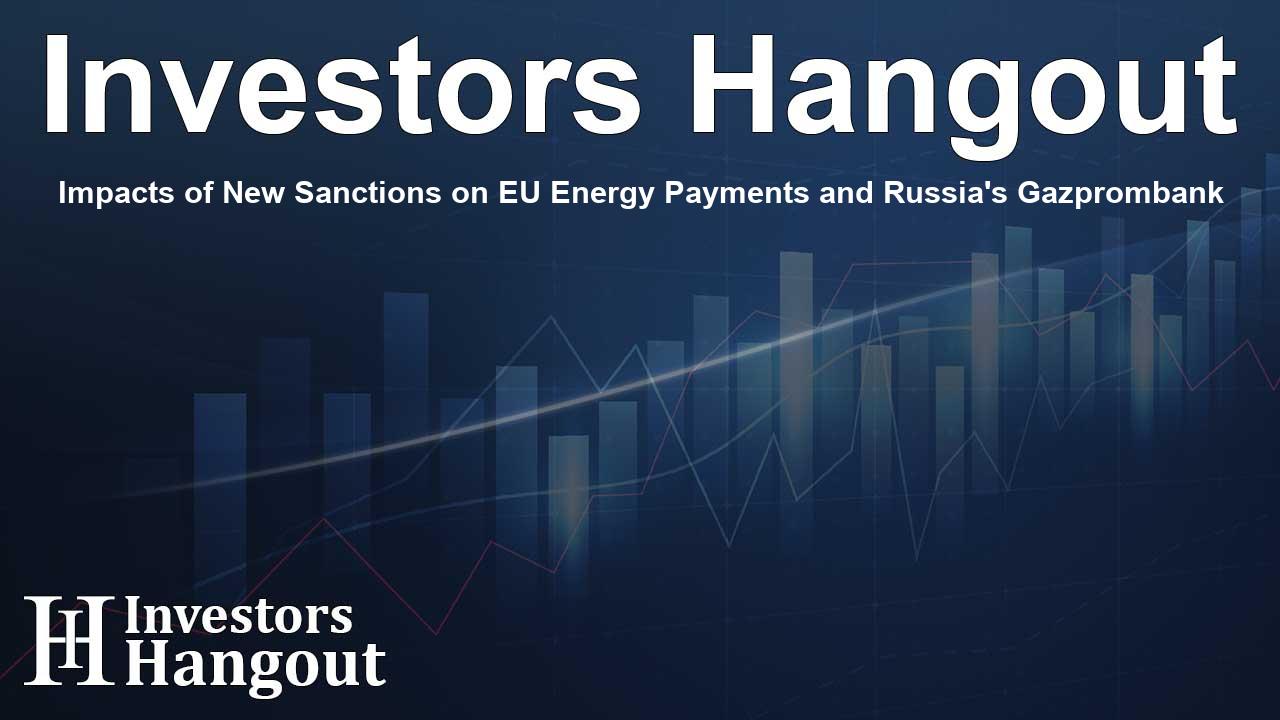Impacts of New Sanctions on EU Energy Payments and Russia's Gazprombank

Effects of U.S. Sanctions on Gazprombank
Recent U.S. sanctions targeting Gazprombank potentially disrupt the only payment method for European customers wishing to purchase Russian gas. This action could heighten currency volatility in Russia and increase the nation's reliance on China, according to experts.
Sanctions Overview
On a Thursday, Washington imposed comprehensive sanctions on Gazprombank, preventing this state-controlled financial institution from processing any energy-related transactions connected to the U.S. financial system. Additionally, about fifty other Russian banks faced sanctions, including the Bank of Russia's System for Transfer of Financial Messages (SPFS).
Implications for European Customers
Countries like Hungary and Slovakia, who have established long-term agreements with Gazprom, are closely examining the repercussions of these sanctions. Russian Deputy Energy Minister Pavel Sorokin remained tight-lipped regarding the future of Gazprombank as a viable payment option for European clients. Analysts from Sinara Investment Bank indicated that payments through Gazprombank will likely cease by the end of the upcoming year.
Operational Changes
The sanctions include a wind-down period, allowing transactions involving Gazprombank until December 20 of the current year and those linked to the Sakhalin-2 oil and gas project until June 28, 2025. In response, the Kremlin labeled these sanctions as an effort by Washington to obstruct Russian gas exports, although they claimed a workaround would be discovered. Gazprombank reassured that the sanctions wouldn't disrupt its banking operations, but questions regarding alternative payment methods remained unanswered.
Shift in Payment Modalities
In early 2022, Russia mandated that entities perceived as hostile to Russia must make gas payment conversions from hard currency to roubles. This entailed opening two separate accounts at Gazprombank—one in roubles and another in a foreign currency. With this new shift, these countries will need to identify a different intermediary for processing payments.
Potential for Future Transactions
The U.S. government has consented to certain energy transactions with specified exemptions for a dozen Russian financial institutions until April 30, 2025. Some market analysts speculate that Gazprombank might be included in this exemption list, providing a potential glimmer of hope for European businesses reliant on Russian energy.
Broader Geopolitical Context
The current sanctions align with the ongoing escalation of geopolitical tensions, with discussions around possible changes depending on U.S. political developments. Economists at Renaissance Capital noted the outgoing administration's actions as utilizing available tools due to a pressing political timeline.
Challenges for the European Union
The EU must brace itself for potential gas supply interruptions, highlighted by Yevgeny Kogan, a professor at Moscow's prestigious Higher School of Economics. Concurrently, Russia is anticipated to face rising obstacles in terms of settlement and payment structures, reflecting negatively on its economy. Kogan emphasized that these sanctions are already exerting adverse effects on the rouble and foreign currency inflow into Russia.
Effects on Trade with China
Analysis from Alfa Bank suggests that Gazprombank's restrictions and issues with Russia's financial messaging system could further complicate financial transactions with Russian partners. This scenario is likely to lead to an increased proportion of Chinese firms in Russia's trade, shifting the dynamics of international commerce.
Long-Term Economic Shift
In the long haul, new sanctions might encourage Chinese enterprises to explore avenues for direct investment in Russia, facilitating a closer economic relationship. As Russia’s economy expands its trade links with China, this shift could significantly reshape international financial interactions.
Frequently Asked Questions
What are the main implications of the new U.S. sanctions on Gazprombank?
The sanctions prevent Gazprombank from processing transactions connected to the U.S. financial system, likely disrupting payments for EU energy resources through this bank.
How long will the transition period for Gazprombank last?
The wind-down period for certain transactions involving Gazprombank is set until December 20 of the current year.
What challenges might Russia face due to these sanctions?
Russia could encounter challenges in payment settlements and currency inflow, potentially impacting its economy and financial stability.
Will European countries find new intermediaries for energy payments?
Yes, European countries will need to search for alternative intermediaries for processing payments as Gazprombank loses its capability to handle transactions.
How might these sanctions affect Russia's trade with China?
These sanctions could foster closer economic ties between Russia and China, as Russian companies may look to enhance cooperative investments and trade dynamics.
About Investors Hangout
Investors Hangout is a leading online stock forum for financial discussion and learning, offering a wide range of free tools and resources. It draws in traders of all levels, who exchange market knowledge, investigate trading tactics, and keep an eye on industry developments in real time. Featuring financial articles, stock message boards, quotes, charts, company profiles, and live news updates. Through cooperative learning and a wealth of informational resources, it helps users from novices creating their first portfolios to experts honing their techniques. Join Investors Hangout today: https://investorshangout.com/
Disclaimer: The content of this article is solely for general informational purposes only; it does not represent legal, financial, or investment advice. Investors Hangout does not offer financial advice; the author is not a licensed financial advisor. Consult a qualified advisor before making any financial or investment decisions based on this article. The author's interpretation of publicly available data shapes the opinions presented here; as a result, they should not be taken as advice to purchase, sell, or hold any securities mentioned or any other investments. The author does not guarantee the accuracy, completeness, or timeliness of any material, providing it "as is." Information and market conditions may change; past performance is not indicative of future outcomes. If any of the material offered here is inaccurate, please contact us for corrections.